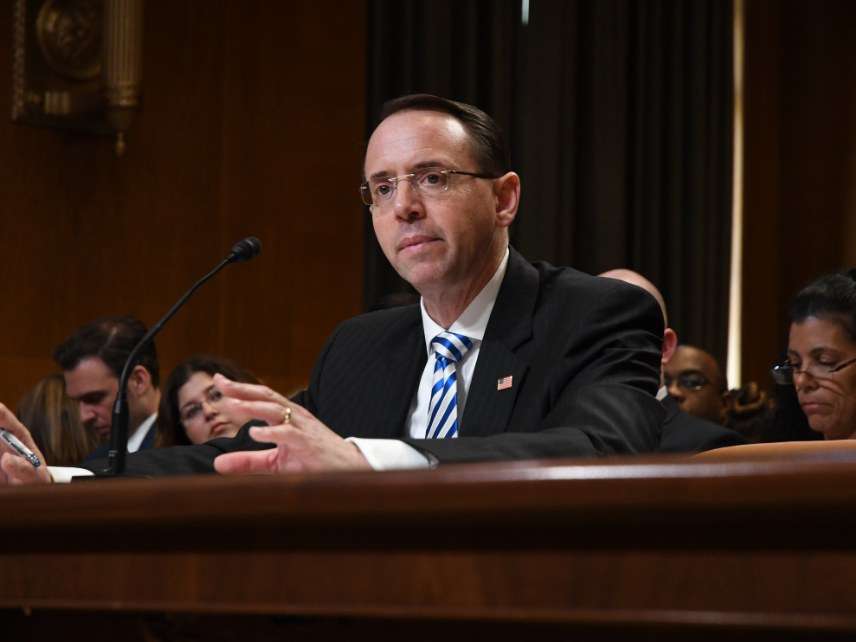Justice Department Bizarrely Uses Madoff to Defend Taking People's Stuff Without Convicting Them First
Twisted incentives? What are those? Rod Rosenstein doesn't seem to have heard of them.

The Department of Justice has brought out the big guns to defend the largely indefensible law enforcement tool of civil asset forfeiture. In a remarkably deceptive Wall Street Journal piece, U.S. Deputy Attorney General Rod Rosenstein tries to use the Bernie Madoff fraud case to argue that civil asset forfeiture is an important tool to return stolen money to the victims of a crime:
Thanks to civil asset forfeiture, the Department of Justice is announcing today the record-setting distribution of restitution to victims of Bernard Madoff's notorious investment fraud scheme. We have recovered $3.9 billion from third parties—not Mr. Madoff—and are now returning that money to more than 35,000 victims. This is the largest restoration of forfeited property in history. Civil forfeiture has allowed the government to seize those illicit proceeds and return them to Mr. Madoff's victims.
Why use civil forfeiture instead of prosecution? Not everyone who possesses illegal proceeds can or should be criminally prosecuted. Many criminals transfer ill-gotten gains to relatives or friends, and others use couriers to transport cash. In such cases, civil forfeiture enables the government to recover property when prosecuting the person caught holding it may not be appropriate or feasible.
Rosenstein says that the Justice Department has used asset forfeiture (both civil and criminal) to return billions of dollars to the victims of crimes. He wants Americans to come away from this commentary thinking the government takes property from the worst of our crooks and returns it to innocent citizens.
The reality is very different. There's a reason why Rosenstein's piece revolves around a couple of high-profile anecdotes and lacks a lot of specifics. That's because civil asset forfeiture is often used against the poor, not wealthy crooks like Madoff. And the police often don't return the money to victims but keep it for themselves, to make up gaps in their budgets or to go on shopping sprees (cowboy hats!). Rosenstein's aim is to stop Congress from restraining the practice.
Civil asset forfeiture is a frequent source of scandal because it allows police and prosecutors to seize property without convicting the owner of a crime or even charging them. There have been dozens upon dozens of stories of police and prosecutors abusing civil asset forfeiture to take property from people who are never shown to be criminals at all. Because it's a "civil" process, the evidentiary thresholds to take the stuff are lower, and the owners of the property have to pay for their own lawyer or attempt to navigate a confusing, opaque court process on their own.
Rosenstein knows this, but he deliberately downplays the negative consequences, acting like it's just like any other civil property dispute. He adds, "There is no logical reason to demand the elevated criminal standard in a lawsuit about illicit proceeds."
The vast majority of civil asset forfeiture cases look nothing like the Madoff case and everything like a brutal shakedown of citizens amid a never-ending drug war. The Washington Post's Radley Balko reported on a case just the day before Rosenstein's op-ed appeared where a drug task force in Alabama raided a home, the stress of the raid prompted a man at the house to develop heart problems, and he ultimately died. Undaunted, the police then seized the family's home, auctioned it off, and kept the money for themselves.
There is indeed a "logical reason" to demand a criminal standard to seize property: It's for the very purpose of making it harder for police and prosecutors to take people's stuff without strong proof it's connected to a crime. The point is to reduce the incentives for the government to declare that citizens traveling with cash must surely be involved in illegal undertakings and just seize the money without any additional evidence of wrongdoing. Rosenstein himself encourages this attitude, saying outright in the op-ed that people often don't have an "innocent explanation" for traveling with large sums of cash. That logic reverses the relationship citizens are supposed to have with police and prosecutors. We don't have to prove we're doing something innocent; they are supposed to prove that we are doing something wrong.
In any event, the typical victim of civil asset forfeiture isn't someone traveling with hundreds of thousands of dollars in cash. A recent investigation of asset forfeiture trends (both civil and criminal) in the Chicago area found that the average value of forfeitures over the past five years was worth less than $5,000. Around 11,000 forfeitures were for amounts worth less than $1,000.
Fortunately, polls show massive resistance to Rosenstein's position, cutting across all political affiliations. The more American citizens learn how civil asset forfeiture actually operates in this country, the more they oppose it.


Show Comments (8)